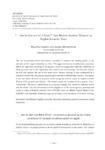But be ſure you let it ſettle: Late Modern Authors’ Presence in English Scientific Texts

Use este enlace para citar
http://hdl.handle.net/2183/38963
A non ser que se indique outra cousa, a licenza do ítem descríbese como Atribución-No comercial-CompartirIgual 4.0 Internacional
Coleccións
- Investigación (FFIL) [877]
Metadatos
Mostrar o rexistro completo do ítemTítulo
But be ſure you let it ſettle: Late Modern Authors’ Presence in English Scientific TextsData
2024Cita bibliográfica
Crespo, Begoña, Moskowich, Isabel, 2024.“… but be ſure you let it ſettle”: Late Modern Authors’ Presence in English Scientific Texts. Atlantis, 467 (1): 149-169
Resumo
[Abstract] The use of pronouns shows the author’s intention to address the reading public or the presence of the target readership in texts. This paper focuses on second-person pronouns, which are especially revealing of the author`s desire to engage the reader by endowing on them an active role in the negotiation and construction of knowledge. For the same reason, we will also analyse the use of the word reader. Science writing is thus understood as a dialogue between the two groups of participants involved in knowledge creation. Two usages of you have been detected in previous works using the Coruña Corpus of English Scientific Writing (CC): general and dialogic. The former might be interpreted as a generic “one,” “everybody;” the latter, considered as an in-group strategy that embraces both the writer and the reader. The detailed analysis of the pragmatics of the second person pronouns and reader in Corpus of English Chemistry Texts (CEChET) and Late Modern English Medical Texts (LMEMT) will hopefully shed some light on the object-centred nature of scientific writing. [Resumen] El uso de pronombres por parte de un autor o autora muestra su intención de dirigirse a su
público lector o la propia presencia de ese público destinatario en los textos. Este trabajo se centra en los pronombres de segunda persona que revelan de forma especial el deseo de
los/las autores/as de implicar a la audiencia al otorgarles un papel activo en la negociación
y la construcción del conocimiento. Por la misma razón, analizaremos también el uso de la
palabra reader (lector). La escritura científica se entiende, por tanto, como un diálogo entre
dos grupos de participantes en la creación del conocimiento. En trabajos previos usando
el Coruña Corpus of English Scientific Writing (CC) se detectaron dos posibles usos de you:
general y dialógico. El primero puede interpretarse como un “one,” “everybody” genérico;
el segundo puede considerarse una estrategia de pertenencia a un grupo que se refiere tanto
a las escritoras y escritores como al público lector. El análisis detallado de los aspectos
pragmáticos de estos pronombres y de la forma reader en el Corpus of English Chemistry
Text (CEChET) y en Late Modern English Medical Texts (LMEMT) quizás arroje luz
sobre la naturaleza objetiva de la escritura científica
Palabras chave
Late Modern English
Scientific discourse
Readership
Personal pronouns
Corpus linguistics
Inglés Moderno Tardío
Discurso científico
Público lector
Pronombres personales
Liingüística de corpus
Scientific discourse
Readership
Personal pronouns
Corpus linguistics
Inglés Moderno Tardío
Discurso científico
Público lector
Pronombres personales
Liingüística de corpus
Versión do editor
Dereitos
Atribución-No comercial-CompartirIgual 4.0 Internacional
ISSN
1989-6840






